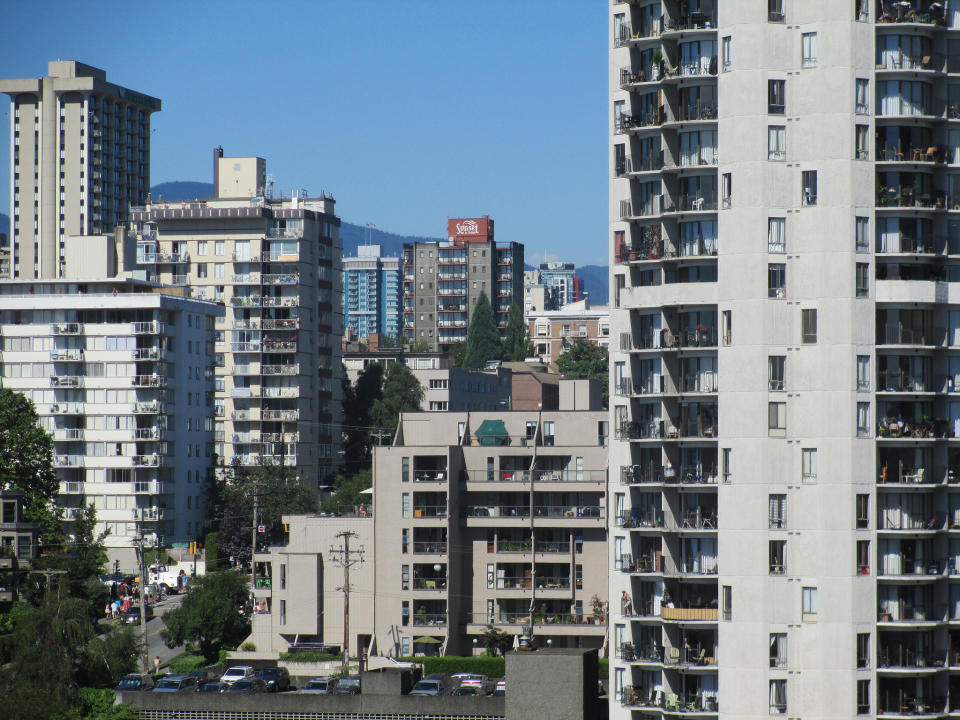Renters feeling the squeeze in Vancouver's hot housing market

Vancouver’s housing market has heated up in recent years, where now a single family home can cost upwards of $2-$3 million. But now that housing frenzy is trickling down to renters, where even renting can seem like a pipe dream.
“People are telling me that they are crying themselves to sleep because they don’t know where they will be living next year,” Judy Graves, a city councillor candidate in Vancouver, tells Yahoo Canada Finance.
She describes dire situations in the Vancouver Metropolitan Area where people are forced to live an hour and a half away from work, and where seniors have to spend through their savings just to have a place to rent.
“The new normal is families of four or five living in one-bedroom apartments,” she says. “They show up at a showing and there are 19 other people that are also looking at an apartment. Whoever has their money out first gets it.”
According to the Canada Mortgage and Housing Corporation, purpose-built rental vacancy rates in the Vancouver Metropolitan Area have decreased to 0.7 per cent in 2016, making the market one of the lowest ranked in the country. In some neighbourhoods, like the city’s University Endowment Lands, vacancy rates hit 0.0 per cent.
In comparison, the Greater Toronto Area, which has also seen a similarly hot housing market, the rental vacancy rate hit 1.3 per cent in 2016 — nearly double Vancouver’s. The national average for 34 of Canada’s large city cores in 2016 was 3.4 per cent.
While the rental situation may seem dire in Vancouver right now, the CMHC is expected to release new numbers for rental vacancy rates for 2017 in October. They say what has been gathered so far suggests there are more rental properties being built in the Vancouver region by the housing industry, but as they are new properties, they may carry a higher price tag.
“A lot of the rental stock that exists was built in the ‘60s and ‘70s,” Braden Batch, CMHC senior market analyst says. “More recent projects do command a higher rent than old projects.”
To tackle her city’s housing crisis, Graves has campaigned on the Made-In-Vancouver Housing Plan, which among getting the homeless off the streets aims to get lower to middle-class citizens rental units they can afford.
The plan calls for taxing the top five per cent of the wealthiest property owners and have the city use that money to create new rental housing. Those units would be rented out to tenants at no more than 30 per cent of their income.
It’s not just Graves who is concerned about how expensive it has become to live in the city. The high cost of living in Vancouver has also been noted by realty experts, too.
“Housing in Vancouver is very expensive, pushing more people into the rental market and impacting availability,” Mark Bernhardt of Zoocasa Realty says. “Many sellers are taking what we call a ‘wait and see’ approach at the moment — holding off from listing their property while they wait to see if there are changes in the market. This has the effect of keeping prices high, but sales transactions (and inventory) low.”
In the Made-In-Vancouver Housing Plan, the city would also get properties from inclusionary zoning, where 20 per cent of the units in a new building would be given to the city, and those units would be rented for a fraction of what it may have otherwise cost the tenants. Any income created through these properties would go back to funding more housing.
And with the property surtax, Graves hopes the city would be have more influence on the types of building built, so Vancouver won’t be a city of just glass skyscrapers.
With the housing crisis continuing to take a toll on the city, others have voiced their suggestions on how to ease it, including regulating Airbnb, adding an empty homes tax and enforcing a rent freeze. They’re all ideas Graves supports, but she says creating more rental units is key to solving the city’s housing problem.
“Everything would help, but unless there’s a plan to actually address the creation of new rental stock, nothing is going to do much,” she says.
Download the Yahoo Finance app, available for Apple and Android.

